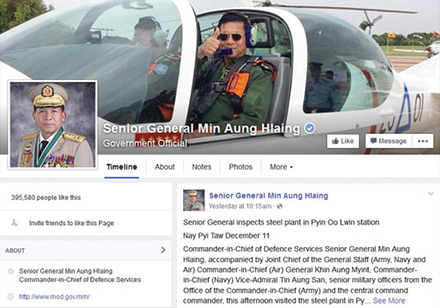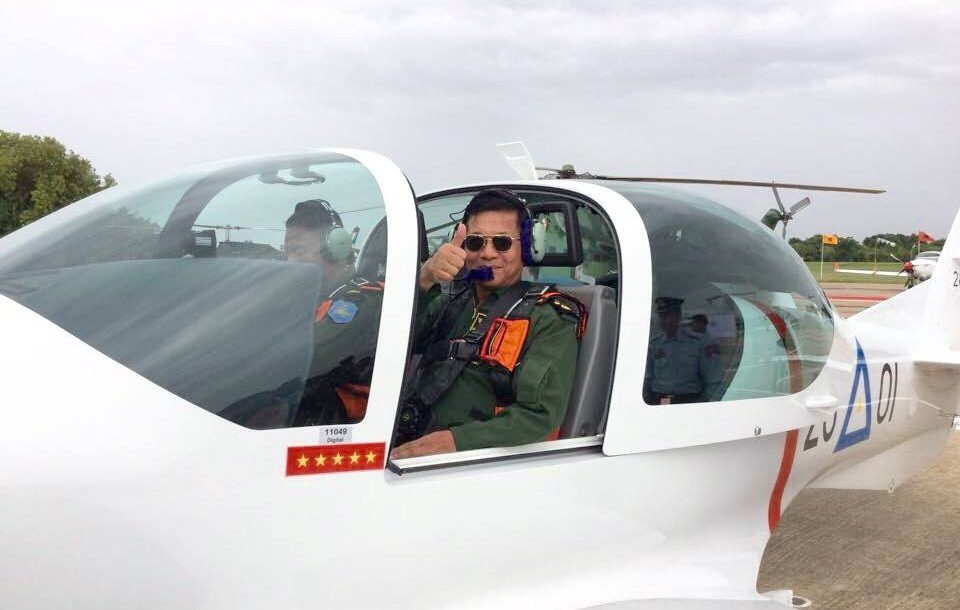
This column was published in The Myanmar Times on Monday, 14 December 2015
Earlier in the year I wrote a column drawing attention to the vibrant Facebook presence of Senior General Min Aung Hlaing. His PR team have clearly decided there is no point in avoiding Myanmar’s social media platform of choice.
The general has now clocked up almost 400,000 followers. It is a big number: bigger than the best-guess estimates of the Tatmadaw’s uniformed personnel, which is currently somewhere between 300,000 to 350,000.
On Facebook, his posts in Myanmar and English often receive dozens of comments and thousands of “likes”.
Since the election Senior General Min Aung Hlaing’s statements have sought to position the Tatmadaw as the country’s primary security, rather than political, institution. This is an astute manoeuvre at a time when the Myanmar people are not going to accept the re-militarisation of their politics.
Given what happened the last time the National League for Democracy won an election, many are wary of the generals’ ambitions. Trust remains in deficit.
Yet on current indications there is an appetite, among the highest ranks, for further diminishing the military’s political role. It is happening step-by-step, and not without some hesitation, which is why some people assert that little has changed and that the army is still in-charge.
Such assertions are about to get their big test.
Current evidence points to the military leadership’s overwhelming comfort with the NLD’s resounding victory at the November polls.
Daw Aung San Suu Kyi has now held all the key meetings — with President U Thein Sein, Senior General Min Aung Hlaing and retired Senior General Than Shwe.
It is that last meeting that looks to have put in place the next stage in Myanmar’s gradual elite rapprochement.
U Than Shwe – as the former State Peace and Development Council supremo is now known – has kept a low profile since U Thein Sein and Senior General Min Aung Hlaing took power in 2011.
While members of his family have occasionally received some public attention, the old general has been content to stay in the shadows. Throughout these years there have been murmurings of his quiet influence.
It would, of course, be surprising if he had completely lost interest in political and economic matters. Well-informed sources still claim that as the power behind the road map to disciplined democracy he wants credit for the way that his plans created momentum for peaceful change.
This is still hard to swallow for many NLD supporters. From their perspective, U Than Shwe was the architect of a quarter century of missed opportunities. They still lament the difficult decades when democratic activists struggled against an unflinching military machine.
Now the challenge for both sides is to find the middle ground that will support new types of interaction. Both democrats and militarists will need to compromise.
On first impressions, Daw Aung San Suu Kyi seems to have accepted the notion of working closely with senior military figures.
She appreciates that the Tatmadaw’s vast land holdings, murky configuration of businesses and economic off-shoots, and tight enmeshment of family, religious and commercial endeavours mean the generals will need to be carefully managed for the very long term.
Her own father’s status in the pantheon of Myanmar’s military heroes also makes it possible for her to find common interests. It probably helps that the key military powerbrokers have got to know her better during these recent years when they have all been forced to contend with the new environment of Nay Pyi Taw.
Where the top generals may have previously associated the NLD with foreign meddling, they now find increasingly that the democrats speak with a comfortingly Bamar accent.
In a system where shared suffering is a form of social currency, military men and democratic activists have quite a bit to discuss.
Take the country’s civil wars for a start. Since well before the current senior leadership joined the army in the 1970s and 1980s, the military’s supreme position has been justified by an ardent nationalist agenda.
The consistent features have been maintaining territorial integrity, stomping out secessionist impulse and asserting a narrow vision of national pride. It has been hard work. Nobody, not even senior military officers, knows exactly how many of their own troops have been killed in battle.
In Myanmar’s case, the length and intensity of conflict mean that almost no family has been untouched. Healing these countless wounds will take time and an unprecedented patience.
With a political network that still stretches the length and breadth of the country, the armed forces remain Myanmar’s premier institution for power projection. The fact – widely recognised in the NLD – is that nobody else comes close.
This will obviously need to change if the nascent democratic transformation is to be sustained. For now, the NLD’s strategists should be keeping a close eye on Facebook and all the other “democratic” outlets for military messages.
Against the odds, it is Facebook that has become the platform of choice for the new generation of Tatmadaw commanders.
Nicholas Farrelly is director of the Myanmar Research Centre at the Australian National University and co-founder of New Mandala.
 Facebook
Facebook  Twitter
Twitter  Soundcloud
Soundcloud  Youtube
Youtube  Rss
Rss 